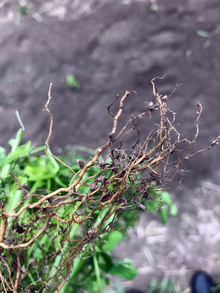Take a look at the supplies sections of seed catalogs and garden supply companies and you will see dozens of options for microbial products that claim to fight disease, boost plant resilience, and enhance nutrient uptake. There are so many types of products to choose from, it can be overwhelming to know which types of products to use and if they are even necessary in the first place.
Adding microbes to your garden
These products tend to include four primary types of microbes:
- Rhizobia are bacteria that colonize the roots of legumes and form nitrogen-fixing nodules. There are specific strains of rhizobia for different garden plants like peas, beans, peanuts and cover crops.
- Arbuscular mycorrhizal fungi form symbiotic associations between fungi and plant roots. They improve nutrient uptake, especially in phosphorus-limited, saline or drought-prone soils, and they can improve soil structure over time.
- Other beneficial fungi like Trichoderma live within the roots of plants.
- Other beneficial bacteria like Bacillus.
Let’s start with rhizobia
While rhizobia do naturally occur in many soils, they may not be present in large enough quantities to fix substantial amounts of nitrogen in your soil, especially if you do not regularly grow legumes.
Rhizobia are affordable and easy to find — check out any seed catalog or your local garden center. Sometimes rhizobia are sold in packets that look just like seed packets, and other times they are kept in the refrigerator, so be sure to ask at the counter if you don’t immediately see them on a seed rack.
If you are inoculating your legumes with rhizobia, make sure to choose the right strain (the package will say which plants it is compatible with) and avoid over-fertilizing. If there is too much nitrogen present, your plants will not bother to form a relationship with these nitrogen-fixing bacteria.
Other microbes
These microbes are all naturally occurring in soil, but inoculating your soil with them may provide additional nutrient uptake and disease suppression benefits.
They can help with disease suppression in a few key ways:
- They can outcompete other microbes simply by having larger populations and using more of the resources in soil.
- They can produce compounds that are toxic to other microbes, or actually parasitize other microbes.
- Finally, they can in some cases activate the immune responses of plants, making them more ready to fight diseases.
So if they are already present, is it worth using them?
The answer for many home gardeners is probably not. Adding new microbes to your soil is always a gamble, and the success of these products is highly variable.
Success depends on existing microbial communities in your soil, climate, soil texture, pH of your soil, and more. So we don’t always see these new, added microbes stick around once applied.
The other thing is, many of these microbes are already present in our soils, and so using practices that help them to flourish may be more beneficial than trying to add them.
Tips for keeping native microbes happy
By fostering healthy soils, you also foster healthy soil microbes. The following practices will help to keep your garden soil healthy for years to come:
- Apply compost to your soil, ideally each year. Keep in mind that some compost is high in phosphorus, so test your soil regularly to make sure that the phosphorus levels are not too high. For more information on adding compost to your garden, check out our compost page.
- Use cover crops when you are not actively growing vegetables. The easiest time to do this is in the fall after you’ve harvested your veggies, but there are many windows of opportunity for planting a cover crop in a vegetable garden.
- Reduce soil disturbance or tillage as much as possible. Using raised beds or permanent beds is a great way to do this.
Dig Deeper
Extension educators across the Midwest and Great Lakes region host a weekly vegetable webinar and podcast called The Vegetable Beet. In mid-May, I interviewed Dr. Lori Hoagland, a microbial ecologist at Purdue, about microbial inoculants. In the interview, we touched on much of what is in this article but went much more in-depth. You can stream the episode here, or anywhere you listen to podcasts.
Borriss R. (2015) Bacillus, A Plant-Beneficial Bacterium. In: Lugtenberg B. (eds) Principles of Plant-Microbe Interactions. Springer, Cham. https://doi.org/10.1007/978-3-319-08575-3_40
Chatterjee R., Roy A., Thirumdasu R.K. (2017) Microbial Inoculants in Organic Vegetable Production: Current Perspective. In: Zaidi A., Khan M. (eds) Microbial Strategies for Vegetable Production. Springer, Cham. https://doi.org/10.1007/978-3-319-54401-4_1
Fiorentino, N. et al., 2018. Trichoderma-based biostimulants modulate rhizosphere microbial populations and improve N uptake efficiency, yield, and nutritional quality of leafy vegetables. Frontiers in Plant Science. DOI 10.3389/flps.2018.00743
Gupta M.M. (2020) Arbuscular Mycorrhizal Fungi: The Potential Soil Health Indicators. In: Giri B., Varma A. (eds) Soil Health. Soil Biology, vol 59. Springer, Cham. https://doi.org/10.1007/978-3-030-44364-1_11
Santos, M.S., M.A. Nogueira, M. Hungria. 2019. Microbial inoculants: Reviewing the past, discussing the present and previewing an outstanding future for the use of beneficial bacteria in agriculture. Applied Microbiology and Biotechnology 9: 2-5.
Mycorrhizal Inoculants For Vegetable Crops. Seminis Vegetable Seeds. https://www.seminis-us.com/resources/agronomic-spotlights/mycorrhizal-inoculants-vegetable-crops/


